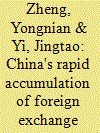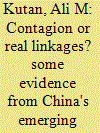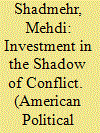| Srl | Item |
| 1 |
ID:
076891


|
|
|
|
|
| Publication |
2007.
|
| Summary/Abstract |
In late February 2006, China surpassed Japan to become the world's largest holder of foreign exchange reserves. Beijing is now faced with the growing challenge of how to handle these vast reserves effectively. Although China's soaring foreign exchange reserves indicate that its overall strength has grown, they have created internal and external pressures on the balance of the economy, and introduced risks to the financial system. It is estimated in the present study that foreign exchange reserves of approximately US$ 400bn in 2005 would have been appropriate under circumstances of a managed floating exchange rate regime and capital control. China's actual reserves have far exceeded its normal demand. The objective of China is to maintain an optimal level that maximizes net benefits as a whole. Four main policy options are available for China to achieve its target: spending and investing foreign exchange reserves, gradual liberalization of the capital account, diversification of foreign exchange reserves and a switch in holders of foreign exchange reserves. Spending and investing in foreign exchange reserves can be undertaken in combination with liberalization in the capital account, given careful consideration of the risks involved. Liberalization should be extensive but gradual so that companies and individuals can adjust to changes in financial markets and manage portfolios while avoiding unnecessary risks.
|
|
|
|
|
|
|
|
|
|
|
|
|
|
|
|
| 2 |
ID:
078279


|
|
|
|
|
| Publication |
2007.
|
| Summary/Abstract |
This paper empirically tests the existence of contagion using data on China's five parallel markets with different entry barriers for foreign capital. Taking the 1997 stock market crash as our experiment and using data on A, B and H shares, red chips and American depository receipts, the present paper tests whether these China-backed market returns respond differently to foreign shocks during the pre-1997 and post-1997 crash period. Evidence suggests that the contagion effects are stronger in markets with fewer entry barriers. An important implication of our findings is that countries vulnerable to contagion could be justified to impose some limits on capital flows.
|
|
|
|
|
|
|
|
|
|
|
|
|
|
|
|
| 3 |
ID:
168535


|
|
|
|
|
| Summary/Abstract |
In conflict-prone societies, the fear of expropriation that accompanies a regime change reduces capital investment. These reductions in investments, in turn, harm the economy, amplifying the likelihood of regime change. This article studies the implications of these feedback channels on the interactions between globalization, capital control, state repression, and regime change. I show that processes that facilitate capital movements (e.g., globalization, economic modernization, and technologies that reduce transportation costs) amplify the likelihood of regime change in conflict-prone societies and strengthen the elite’s demand for a strong coercive state. In particular, to limit their collective action problem and manage the political risk of regime change, capitalists support a state that imposes capital control. We identify two conflicting forces, the Boix Effect and the Marx Effect, which determine when capital control and state repression become complements (Nazi Germany) or substitutes (Latin American military regimes) in right-wing regimes.
|
|
|
|
|
|
|
|
|
|
|
|
|
|
|
|
| 4 |
ID:
064616


|
|
|
|
|
| Publication |
Jul-Aug 2005.
|
|
|
|
|
|
|
|
|
|
|
|
|
|
|
|